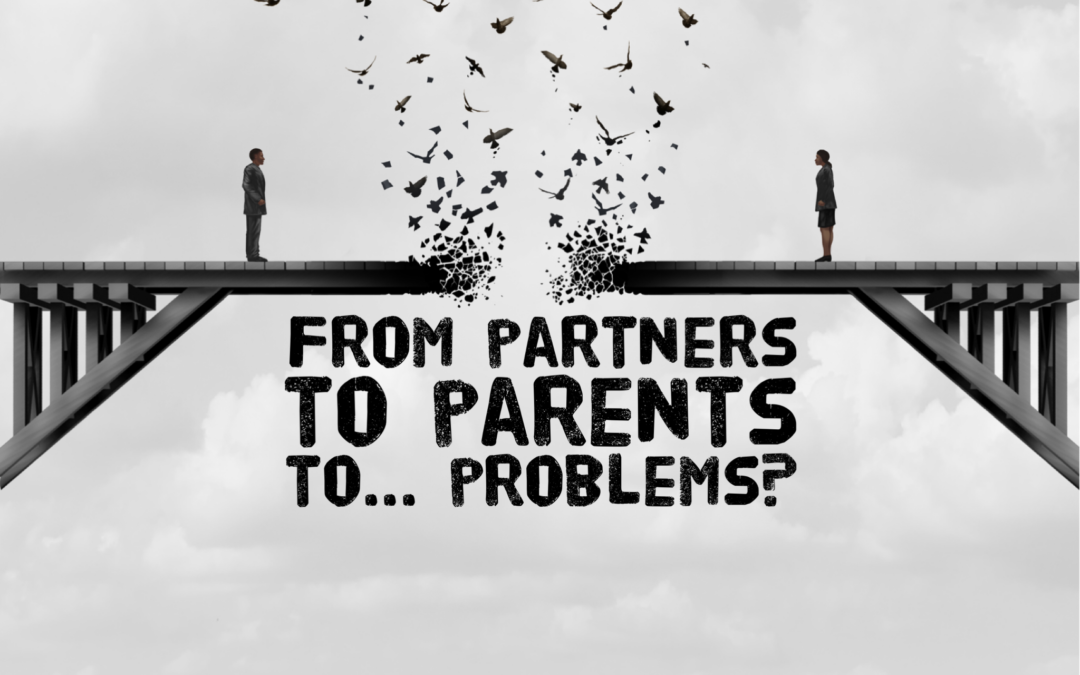When my husband Avi and I got married, we were both a bit surprised at how smoothly we transitioned from dating into marriage. I guess I expected it to feel different, although I don’t know why. But somewhere in my mind I equated marriage with challenge (read into that one, Freud).
So when that prediction of challenge did not come true in those first 2 years, I swung a bit in the opposite direction. As in “We are solid! Nothing’s gonna stop us!” Perhaps a little cocky, even?
But then I became pregnant.
And then we became parents.
And, yah, that’s when shit hit the fan.
You see, for some couples, life throws challenges at them right away. Sometimes at the onset of marriage, sometimes even while dating. Maybe the challenges involve finances. Maybe someone experiences a significant loss. Maybe there’s infidelity, or maybe there is a major health crisis. These couples don’t even have a chance to get cocky, they are too busy tackling all the stuff being thrown at them.
But for most of us, the challenges we face during our courtship and early marriage years are small stuff. I’m talking about the kind of stuff where it’s still easy to turn to each other for support, and you’re able to contain your feelings without letting them spill into the relationship.

For those couples, just like with me and Avi, parenthood is likely to turn your world upside down. Because this is your first time as a couple when both of you are likely to experience raw, deep-rooted, intense emotion connected to the weight of this tiny new person being entrusted to you.
In the best case scenario you will both feel immense responsibility for your baby, a feeling which naturally lends itself to strong opinions about how best to follow through on that responsibility. And the chances that those opinions will differ at some point, on some issue is 100% (scientifically speaking, of course).
In the worst case scenario, one partner will feel the sense of responsibility for their baby, while the other acts as though life hasn’t change. And you can imagine that that doesn’t go over well.
We are able to tolerate each other’s differences much more easily prior to having kids because there’s fewer factors forcing us to choose a united position. So if one of us wanted to prioritize healthy eating and the other wanted to enjoy their favorite foods, healthy or not, there was a bit of a “to each their own” mentality that applied. But once you have a child, suddenly you and your partner’s choices often have to funnel into one “family choice”. And this is where the conflict happens.

Now you have to decide whose view on food is going to prevail with the baby. And who’s going to decide how to handle night wakings? And whose idea about frequency of bathing is going to take precedence? And how much money is appropriate to spend on baby things? And what about breastfeeding vs. formula? Or when it’s ok to leave the baby with another caregiver?
You may find that you and your partner’s opinions align on some of the questions I just gave as an example. But what you don’t fully appreciate until you’re in the parenting hot zone, is that there are a million of these decisions to make. All day long, every day of the week. So rest assured, there will be times (plenty of times) where the two of you diverge.
Most of us enter into parenthood with a certain vision of what it will be like. Usually that vision is shaped by our own experiences as a child, whether we intend to do things in a similar manner or we are consciously trying to do the exact opposite as our parents. Either way, we have this expectation of how we will raise our children.
The only problem is that we forget to account for our partner’s vision. So we go along, anticipating some of our baby’s needs with a plan of how we will respond. But then the moment comes and just as we are about to respond in line according to our vision, our partner interjects with his vision…
“Wait, what?! What are you doing? That’s not the way you do it!” we cry. Because our way is the “right way,” of course.

Except that most often it isn’t. And this is the part that can be hard to swallow. Our vision of raising children is just one way. But there are multiple other ways. And almost all of the time, there is no right way.
So… what’s a couple to do? Here are 3 tips to help you better navigate the murky waters.
1. If you’re not yet parents, do some prep work before baby arrives.
Everything becomes exponentially harder when you’re at the mercy of your precious little baby. So take some time and talk through some of the most common sources of conflict while time is still on your side.
You’re not going to solve it all. So don’t expect to. But it’s a great idea to be able to communicate your opinions and your vision and identify spots where you diverge. Those are going to be the areas to focus on, tenderly.
2. If you’re already parents, try and talk through some upcoming issues before it becomes heated.
Have you noticed that the two of you see a certain topic differently? That’s ok, you can work with that. Find a time to casually bring it up with your partner. If the timing is off, or your partner suggests it’s not a great time, schedule a time to talk about it so you can come up with your unified game plan.
The factor that best predicts how a conversation will end is how it starts. So take care in how you introduce the topic. Don’t come in all “I can’t believe you want to do _______” or “I really need you to see that my way is better.” This is sure to incite defensiveness (because let’s be honest, it really is an attack), and it will do little to reach your goal.
There are lots of alternatives that promote collaboration, such as “Tell me more about why you want to do it that way” or “how do you think your approach will help?” Put your own spin on it to make it feel more natural. But once you’ve got the wording down, make sure the tone you use helps instead of hurts. I can’t even tell you the number of times my husband’s tone got in the way of me engaging productively in the conversation!
3. If you’re in the midst of a disagreement, stop! Take a break and go calm down.
Nothing productive is going to happen if one or both of you is imagining using the other’s face as a punching bag. So walk away. Even if that goes against all advice to “never go to sleep angry.” Because sometimes going to sleep angry is just better than going to sleep divorced.
Once you’re calm, don’t forget to come back to the conversation. But make sure you’re both ready. Just because you’ve calmed down, doesn’t mean your partner has. Waiting until you’re both calm is necessary if you’re looking for a constructive conversation. Trust me!
These three steps are not magic wands that will make everything easier, unfortunately. But they are tools to help you continue to move forward in your partnership and in this parenting gig. Buckle up. It might be a bumpy ride, but the journey is worth it!
QUICK LINKS:
The Upside of Conflict
How Giving Can Shape Your Marriage
How to Work Through Different Perspectives In Your Marriage
____
Dana Basu, PsyD is a licensed clinical psychologist at EverGROW therapy and founder of Everything But Crazy, an online resource for parents. She provides individual therapy, support groups, and online resources for parents in Orange County and throughout the state of California via online therapy. She specializes in working with the highly sensitive person and people with difficult childhood experiences, trauma, parenting stress, and chronic guilt.

